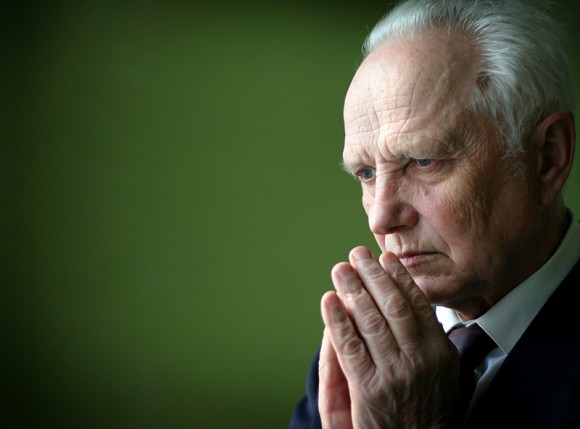Repentance is a personal matter. For I know mine iniquity, and my sin is ever before me (Psalm 50).
Therefore the Great Canon calls upon God from the first person: “Have mercy on me, O God, have mercy on me.” But we have – there is no doubt that we have – a kind of general sinfulness, a general weakness, and a general iniquity. Therefore it also says: “Lord, be gracious unto our sins. Master, pardon our iniquities. Holy One, visit and heal our infirmities for Thy Name’s sake.”
Adam’s nature was mortally wounded. The whole drama of human life can be regarded as the illness and suffering of Adam alone, divided and multiplied among his children. And to this only sick Adam comes the only Christ. He comes, as a Physician, to fulfill the words: For as in Adam all die, even so in Christ shall all be made alive.
There are many of us penitents. Each of us goes alone to the One Christ. But each time individual human persons move towards Christ, Adam’s wounded nature and sick humanity move towards Christ. We can say that sinning in our own individual way, we still sin together and in the same way.
+++
The single penitential impulse is one of the manifestations of catholicity. I do not fast when I myself want to and for whatever reasons I myself think up. But I do fast with the whole Church due to the upcoming Paschal festival. My own relationship to the fast is a measure of my belongingness to the Body of Christ. Not in prayer or virtue alone, but also in fasting, does one have the opportunity to experience the joy of not being alone.
+++
It is interesting whether our mind rejoices in the fact that, along with us, millions of other Christians across the world are also beginning the fast. If we do rejoice, then we can apply to the fast the words of Epiphanius regarding Rublev’s “Trinity.” It was painted, Epiphanius said, so that the vision of the Holy and Undivided Trinity “would overcome the hateful discord of this world.”
Our fast – shared, long, difficult and, at the same time, joyful – is also a means of overcoming the hateful discord of this world. I do not want to dwell only on my sins and weaknesses. I also want, at least occasionally, to think of others’ infirmities and weaknesses.
+++
In terms of everyday needs, we are disturbed by problems that grow from one and the same root. We are not mistaken if we assume that some people do not have jobs, and that others have debts. One mother weeps over her son who drinks, another over the husband that left her as she struggles to raise their children alone. There are problems with apartments, problems with families, problems with money…
One does not have to be especially intelligent to conclude that the majority of problems in the world are understandable to my heart. The same thing concerns both inner problems associated with sin, and therefore with repentance.
+++
The source of humanity’s most painful torments are the passions that live within us. Man has conquered wild animals, harsh nature, and vast landscapes. But green envy and silly resentment, blatant lies and cowardly betrayal, cold revenge and demonic malevolence do not leave him room for happiness.
In all time zones and on all continents, the passions torment human hearts, and people tormented by passions torture each other. People are tormented by fornication, which robs youth of joy; while old age robs one of one’s mind, destroys families, and corrupts one’s bones. People are lured by power, turning into wild enemies those who only yesterday were still eating from a single bowl. And as people increase in knowledge, they simultaneously increase in sorrow; the demons make themselves redundant, inasmuch as we ourselves, to the degree of our sophistication in evil, become comparable to the demons.
So is it not within our strength to feel this common, universal affliction as our own and to pray: “Lord, be gracious unto our sins. Master, pardon our iniquities. Holy One, visit and heal our infirmities for Thy Name’s sake”?!
+++
Prayer for ourselves – the prayer “Have mercy on me, O God, have mercy on me” – is capable of warming the heart to such a degree that the heart itself feels the need for praying for others. “Strengthen the despairing, O Lord” – thus can the praying person then say. “Remember those who have fallen under the cross of everyday life. Encourage the desperate. Wipe away the tears of those who weep bitterly. Help the battle of those who have resolved to resist their passions and lusts.”
Oh! How many such prayers there can be!
Being obliged to love my neighbors, I should rejoice for their correction and grieve for their sins. Whoever does not know how bad people have it does not have a heart. Whoever has never prayed for people, knowing how bad they have it, has neither faith nor grace.
Yes, I myself hope that my prayer and life will one day become what they should be. I honestly do not believe I can correct myself by my own efforts. Then why do I not despair? Or, even if I do despair at times, nonetheless crawl out of these terrible abysses? It is because I live and am saved by the prayer of other, by the pity and mercy of others, which more often than not remain invisible to the eye.
Others pray for me, sometimes those whom I have never seen with my eyes. When I balanced on the edge of madness, someone surely asked Christ: “Let not those who are on the edge perish.” Christ accepted this prayer, and I and those like me find themselves amongst the saved. How often all this has happened in life we will, I hope, find out later.
But now, in these precious days of contrition of heart and long standing in prayer, let us not think of ourselves. Let us think of the fact that the Church ceaselessly prays to the Mother of God, the Archangels, the Forerunner, and the Apostles. Let us think of the fact that the world has not yet perished due solely to the fact that forgiveness, mercy, and care have not ceased. And if the Lord will renew a right spirit within me, my soul will certainly want to pray for others, as for myself, feeling at the same that that someone is praying for me, as for himself.
Translated from the Russian




















